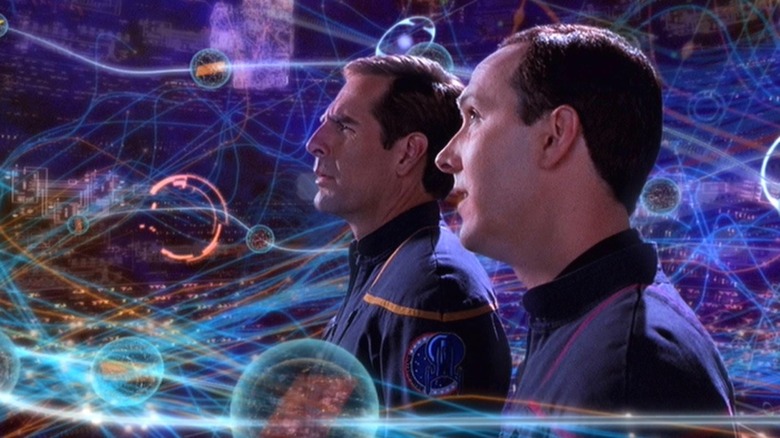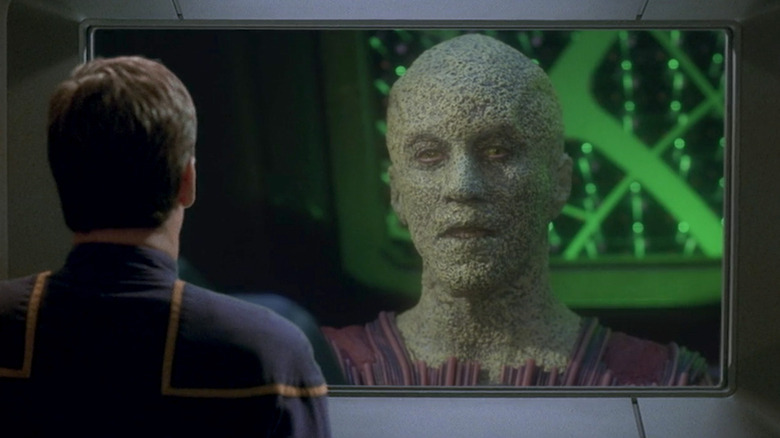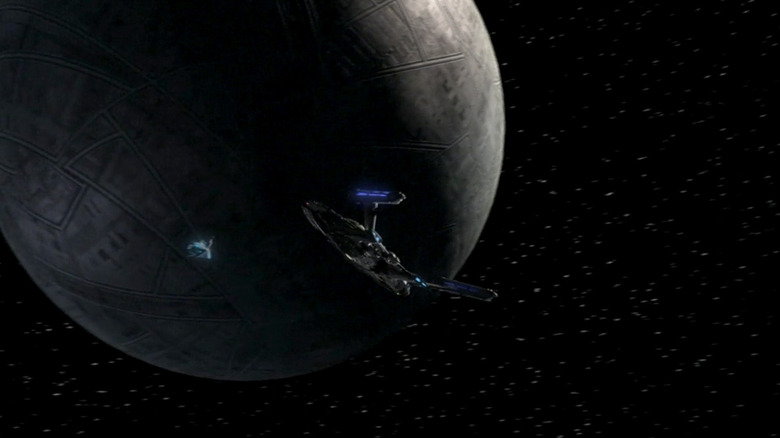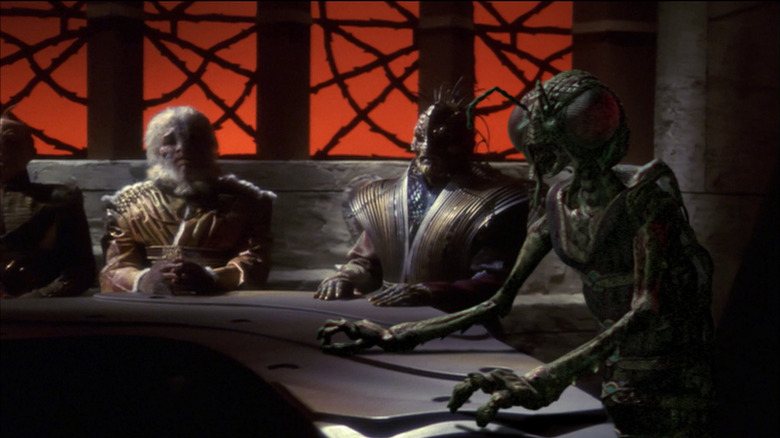Star Trek's Temporal Cold War And Its Messy Behind-The-Scenes Origins Explained
"Star Trek: Enterprise" was originally intended to be a lot more low-tech than it was. "Enterprise" is set roughly a century prior to the original "Star Trek," and show co-creator Brannon Braga initially conceived of a series that was a lot more earthbound. There were to be no transporters, no phasers, and — perhaps most controversially — no trekking. Braga wanted the bulk of the show's first season to take place entirely on Earth as the Enterprise is built and humanity prepares for its first extended mission into space. Paramount, however, didn't like Braga's ideas, feeling that the Enterprise needed to be launched in the pilot. Also transporters. Also phasers. Recognizable Trek iconography was required. Braga reached a compromise by including transporters, but stating that it was still a new technology unsafe for human use. And, yes, Enterprise officers carried phasers.
Paramount wasn't happy with just those cosmetic additions, however. They wanted their new sci-fi series to be way more futuristic; shining lights and fantastical technologies (beyond mere starships) were a must. This led the show's writers to invent a complicated — and not particularly beloved — time travel plot wherein agents from the distant future were visiting the 22nd century to engage in a Temporal Cold War.
The plot got far more complicated and involved a genetically enhanced species called the Suliban taking orders from a shadowy, disguised figure (voiced by Jame Horan) from the 31st century. This figure is never identified.
The creators of "Enterprise" discuss the Temporal Cold War in the invaluable oral history book "The Fifty-Year Mission: The Next 25 Years: From The Next Generation to J. J. Abrams," edited by Mark A. Altman and Edward Gross.
The players in the Temporal Cold War
To briefly recap: multiple factions from the 28th and 31st centuries, armed with contraband time travel devices, had been secretly manipulating history for their own benefit. Because these factions were litigiously forbidden to mishandle causality themselves, they would contact various players in the 22nd century and manipulate them into committing acts of terrorism on the factions' behalf. The Suliban had the above-mentioned shadowy benefactor, but there was also a mysterious species of Sphere-Builders who constructed horrible weapons of mass destruction. The Sphere-Builders knew of a 26th-century future timeline wherein they would be bested by Earth forces, leading them into Earth's past for a tactical advantage. They used a species called the Xindi to destroy Florida and intended to destroy all of Earth eventually.
Captain Archer (Scott Bakula) was made aware of the Temporal Cold War by one of his own Enterprise crew members, a man named Daniels (Matt Winston). Daniels was a temporal agent in disguise and gave Archer a glimpse of battles that would take place a millennium hence. Ever wanted to know what the Enterprise-J looks like?
The whole time travel plot was too complicated to follow and not of much interest to most Trekkies. Braga recalled the entire idea being the result of a studio mandate, and that "Enterprise" was forced into plotlines it didn't necessarily warrant. He said:
"We wanted a fresh way to go about things, and the show wasn't really everything we intended. I'm not putting the blame on the studio, because I don't know if they were right or wrong, but I do know that we didn't really go as 'prequel' as we wanted. The whole Temporal Cold War was put in because they demanded that there be some futuristic thing in it. "
Drop it like a Future Potato
Braga wasn't so fond of the Temporal Cold War story, as he and the show's writers never really made the mystery come together in a satisfying way. He said:
"I just don't think the Cold War element ever really gelled. There was a spooky guy and there were temporal agents and it all fell into some of the convoluted things that time travel tends to fall into, and it didn't really work. It played something of a role in the third season, but Manny Coto, who took over season four of the show, dropped it completely."
The third season of "Enterprise" is where many Trekkies felt the show finally came together, and it was because of the Xindi storyline. They were a mysterious, unknown adversary and they destroyed Florida, leading to a phase in "Star Trek" history wherein Starfleet was poised to be far more militant. It was clearly meant to be a 9/11 metaphor. The Xindi were fascinating, as they were actually constructed of several different sentient species who evolved on the same planet simultaneously. There were primates (like humans), but also arboreals, aquatics, insectoids, and reptilians. Sadly, their eventual connection to the Temporal Cold War wasn't as shocking or satisfying as one might think.
Given how much screen time was devoted to the Temporal Cold War, it's astonishing how infrequently it comes up in conversation between Trekkies. At the very least, the Xindi Incident was mentioned by Kroll (Idris Elba) the villain of "Star Trek Beyond," but that's about as deep as it has gone. No one seemed to like Cold War story.
The other sci-fi show
Braga even revealed he based the Temporal Cold War on a non-Trek sci-fi epic he had been spitballing. He wanted to write a more recognizably human tale about various political powers using time travel to alter history for their own benefit. His idea would have been more striking, however, as it played off of Earth politics that the audience would have known. He described it:
"I had in my head been developing an idea for a different show about a Temporal Cold War where you learn in 1981 time travel was discovered by some physicists and they started f***ing with it. And then China got it. And then Iran got it, and suddenly people are going back in time, and someone did something that f***ed the time line. All the countries realized that they had to strike a temporal accord so no one would use it again."
A time travel story set in 1981 about a war between China, Iran, and other world powers would have been fascinating. In "Star Trek," using previously unknown species like the Suliban and the Xindi, it became a little too abstract.
One might say that the Temporal Cold War fulfilled its function of bringing a high-tech element into a relatively low-tech "Star Trek" show — indeed, one can now buy an Enterprise-J from various model-making companies – but it ultimately wasn't terribly exciting story writing. It might have hurt the show more than helped it.



